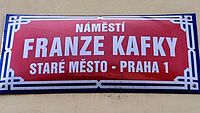
International Exchange at the German Department
„Die Erde fängt an, rund zu werden [...]!“ (Max Frisch)
German Studies as an Intercultural Subject
 German language and literature have always reached out to diverse cultures. In his "Buch von der deutschen Poeterey" (1624), Martin Opitz frequently refers to models from France, Italy, and the Netherlands. During the Enlightenment, German authors found inspiration in French and British literature; Goethe, for instance, admired Shakespeare. In the 19th century, novels of Russian Realism gained popularity in Germany, and in post-war Germany, the works of Hemingway and James Joyce found a fervent readership. This list could easily be extended.
German language and literature have always reached out to diverse cultures. In his "Buch von der deutschen Poeterey" (1624), Martin Opitz frequently refers to models from France, Italy, and the Netherlands. During the Enlightenment, German authors found inspiration in French and British literature; Goethe, for instance, admired Shakespeare. In the 19th century, novels of Russian Realism gained popularity in Germany, and in post-war Germany, the works of Hemingway and James Joyce found a fervent readership. This list could easily be extended.
Moreover, the German language transcends national borders. Its history is inseparable from the intricate processes of linguistic borrowing, just as the histories of other languages are entwined with borrowings from German. This dynamic exchange, unfolding over centuries, reflects the rich network of linguistic and cultural interactions.
German Studies is characterized by its cultural openness across all facets of the subject. Areas such as Medieval German Literary Studies, Modern German Literary Studies, and Linguistics explore these processes of exchange. German as a Foreign Language and German as a Second Language explore intercultural encounters, while Teaching German in Schools plays a vital role in the cultural integration of pupils from other countries.
German Studies are also intercultural in that they exist in various cultures with different emphases, interests, and social functions. The German Department at the University of Regensburg contributes to this cultural diversity by exchanging both students and staff with a whole range of universities throughout Europe and the U.S. with a regional focus on German in Central, Eastern, and Southeastern Europe (DiMOS).



